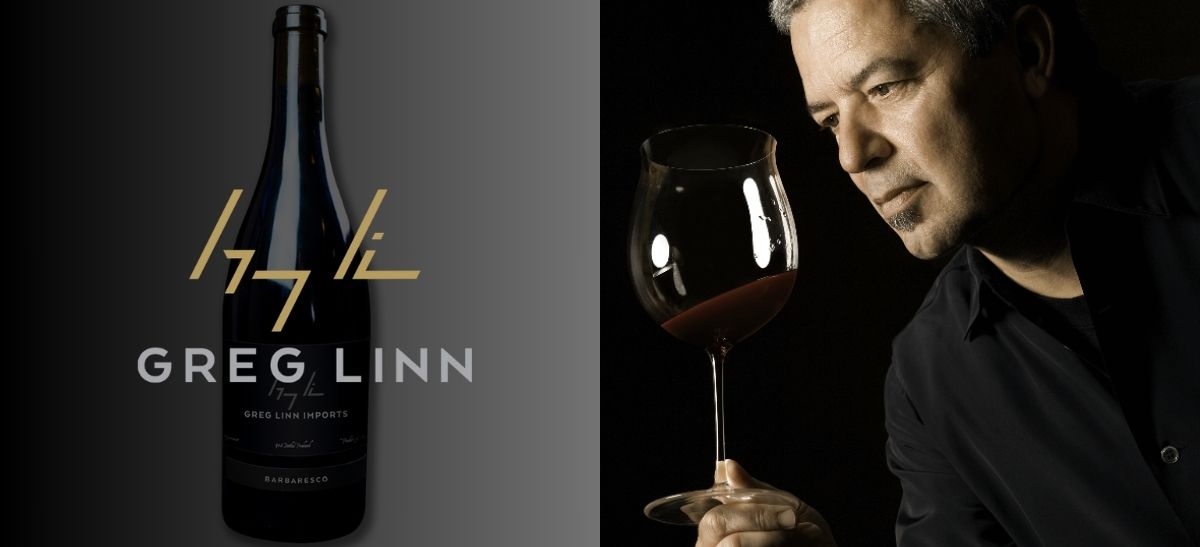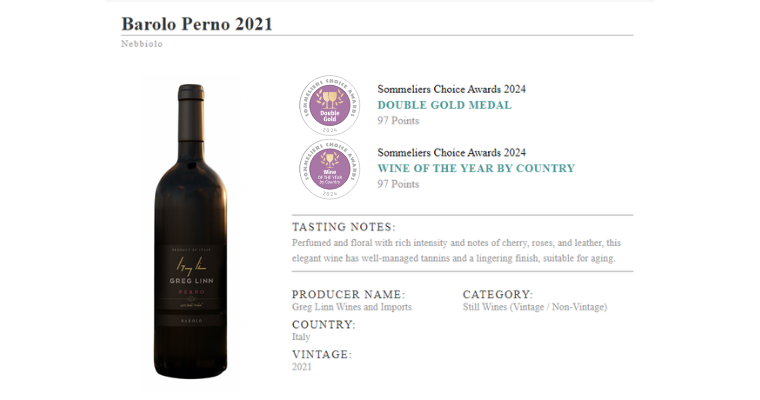Final
Deadline
April 16, 2026
Judging
Date
May 18, 2026
Winners
Announced
June 10, 2026

Greg Linn boasts decades of wine industry experience. He is the principal of a small import company that focuses on both quality and on-premise clients. The Barolo Perno 2021 of La Sacrestia Winery, imported by Linn, won Gold and Italian Wine of the Year at the 2024 Sommeliers Choice Awards. Gregg took the time to give detailed answers to questions for our editor, Charlie Leary.
Yes, I have a long personal history of collecting wine as far back as 40 years. I traveled the wine world, and I don’t think there is any port of call I have not been to that is a wine region. Of course, I met some of the greatest wine producers in the world, and some I call personal friends. I was instrumental in putting on some of the greatest tastings in the Los Angeles and San Francisco area. Most but not all were with my first love, that being Burgundy. A few examples include a 1978 retrospective of Burgundy from the greatest Domaine's; a Henri Jayer tasting out of Magnums; a Leroy vs DRC Tasting; and a vertical of La Tache back to 1929, just to mention a few.
Greg Linn Wines morphed into Greg Linn Imports. I started Greg Linn Wines 24 years ago. Making Central Coast and Carneros Pinot Noir, Chardonnay, and Syrah. But “restless soles,” as the saying goes, and I pulled a few strings from my European relationships. This led me to Barbaresco, and Barolo which are the Burgundy's of Italy. Then to my favorite region in Champagne, Les Mesnil.
This year we will be offering a Bordeaux from the Medoc. Our next goal is Burgundy, but the required capital is debilitating. We shall see.
Tough question! I'm not one to be quiet when I see something wrong. I start by saying this: I truly dislike a person who says, "Don’t let him or her taste that, they wouldn't understand it". I cannot tell you how many back waiters and up-and-coming sommeliers I would send a glass of wine to while dining. And how, many decades later, they came up to me and said that I changed their life. Many of those same people are now wine directors, and some oversee the biggest resorts in the world.
Look, wine is a distant third to beer and spirits. I think it's the responsibility of every oenophile to give back, to educate, and to take the mystery out of wine. Wine labels can be intimidating, let's not add to that intimidation. If you think someone doesn’t know, why not be kind? Because how will he or she ever know?? Sometimes the wine industry cuts off its nose [to spite its face], as the saying goes.
We need to reach out, and I think it starts at home, but at the very least the industry should be on every campus. Especially Davis, Cal Poly, Cornell, Rutgers, and the ag colleges, and there should be advanced wine education classes. Let's pull a few Bud drinkers our way.

Barolo Perno 2021 won double gold at the 2024 Sommeliers Choice Awards along with the best wine from Italy medal with 97 points - the wine is imported by Greg Linn
In Italy: Langhe Nebbiolo, Barbaresco, Barbaresco Meruzzano( a Cru), Barolo Perno, (a cru), Barolo Perno Riserva
In France: Les Mesnil - Ammonite Cuvee, Ammonite Assemblage, Ammonite Rose, and Vintage Ammonite. Soon Bordeaux from the Medoc.
We are small, and our target is every great wine list in any given area. We have very few off-premise locations. We also sell directly from our mailing list and website. We are only in two states, but currently, we are looking [at expanding] towards Texas, New York, and the East Coast.
The wine world and especially the sommeliers are our lifeline. Frankly, we wouldn't exist without their dedication and hard work. Restaurants, Sommeliers, and Wine Directors are our extended family. We cannot say Thank You to them enough.
I'm nothing but honest, so here it goes. There was a time, a very long time, that I dismissed the awards completely. When we first started out, we had one goal, to make the very best wine from any varietal we produced. Those goals have never wavered.
Our very first Pinot Noir, Ambullneo Vineyards 2002 Bulldog, received a 95 score from the Wine Advocate, the gold standard for wine critics at the time. Now, sometimes I get caught talking out of two sides of my mouth, so be it!
The controversy surrounding Mr. [Robert] Parker was that he changed the industry's approach to making wine. First, I want to say these words: he is one of the most honest people I have ever met. And lest we forget what he did for all of us! But those who criticized him, saying his scores led to people making riper wines are putting their blame in the wrong place. The [Wine] Advocate first and foremost instructed people to read the text, not the score. I can't imagine I would ever change the way I made wine to please any individual, that's a sellout. I make wine for my palate and if someone agrees then I'm grateful.
So, we stopped sending wine to competitions. The last time was in 2007, I believe. Why? well, it’s simple: I trust the people in the industry who have done the hard work much more than any wine writer or single individual. I ask this most important question, what if he's having a bad day, the onset of a cold for instance? Is he going to walk away when 50, 100, or 300 wines are prepared for that person to taste? How is that fair to the men and women who made that wine, and put their blood, sweat, and capital into producing it?
Some of the [wine] writers do not have any formal training, more historians and writers than trained professionals. I believe your ability to write and to know the history of a certain place is important, but I'm not going to the world’s most prolific writer to get a take on a particular wine. I'm going to be a trained sommelier.
This is a long answer to your question; however, I believe it hits a nerve.
Until I became aware of the Sommeliers Choice Awards we did not submit for many years. There was pushback from the industry as awards are a moment in time and help support your brand. Many people buy based on scores alone, so the merchant or sommelier has little if any choice; after all, they get paid to sell wine. I believe in the approach of Sommelier Choice because it has trained professionals, and even if one person is having a bad day the group makes the final choices. The singularity vs the group, for me it's not a close call.
1. Outreach, closing the beer and spirits gap.
2. The distribution laws in some states are ancient: reminds me of the blue laws I grew up with back east. Imagine not being able to buy a pair of jeans on Sunday--there was such a time.
3. Education, and the anti-alcohol zealots.
4. Shipping and all that entails
5. Water, environment, and everything that encompasses
How do I overcome [these challenges]? Hard Work!
Enter your Wines now and get in front of top Sommeliers, Wine Directors, and On-Premise Wine Buyers of USA.
